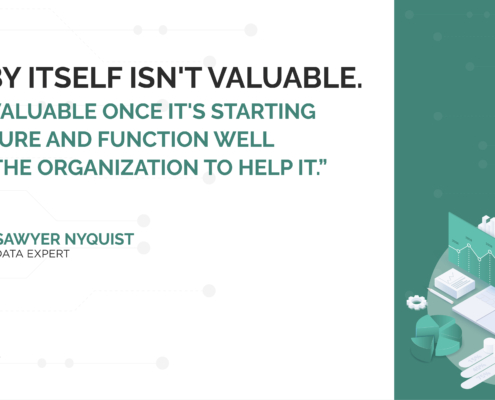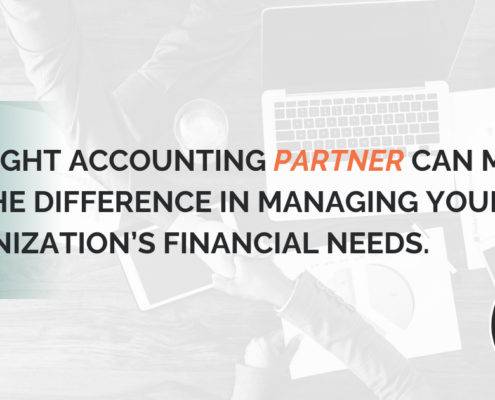
When your nonprofit’s finances feel off—but you can’t quite put your finger on why—it’s often because the accounting system is quietly unraveling behind the scenes. And if your gut is telling you something’s wrong, it probably is.
In this episode of A Modern Nonprofit Podcast, Tosha Anderson sits down with Nancy Fussner, Director of Onboarding at The Charity CFO, to walk through the top five red flags that your accounting may be messier than you think—and exactly what to do about it.
This isn’t just about spreadsheets. It’s about sustainability, compliance, and having the confidence to lead your mission with clarity.
1. Your Bank Balance Doesn’t Match Your Books
If the balance in your accounting software doesn’t match your bank statement, you’re flying blind. Without accurate reconciliations, your cash position is a guess at best. You could be double-counting income or completely missing payroll runs—mistakes Nancy’s team uncovers week after week.
To fix this, start by performing monthly reconciliations for every bank and credit card account. Use accounting software with built-in reconciliation tools, and make sure someone other than the bookkeeper is reviewing them for accuracy.
Principle #9: Monthly Reconciliations & Reports The accounting team should close the books monthly, ensuring that all statement of financial position accounts are reconciled. Monthly financial reports should be shared with leadership on a consistent timeline. This principle isn’t optional—it’s foundational.

2. You Can’t Trust Your Financial Reports
If your reports say you’re flush with cash but you’re struggling to make payroll, something’s off. A disconnect between your reports and reality can signal overstated income, like grants that have been booked but not received, or missing liabilities like unpaid bills. Inconsistent reporting leads to poor decision-making and confusion at every level.
The fix? Scrub your balance sheet for outdated receivables and unrecorded liabilities. Standardize your templates and reporting structure. And train non-accounting staff to code and document transactions correctly so that financial data flows cleanly into your reports.
Principle #20: Multi-Dimensional Accounting Segment your reports by funder, department, or program to understand what’s really happening—and make decisions based on reality, not assumptions.
3. You’re Not Tracking Restricted Grants Properly
Not knowing how much restricted funding you have left—or how it’s supposed to be used—is a disaster waiting to happen. Violating grant restrictions puts your funding and reputation at risk. It can also trigger audits, repayment demands, and a breakdown of trust with your board and funders.
Use your accounting software to tag and track restricted funds. Build grant-specific reports that show spending versus remaining balance. And ensure your program and development teams know how to code expenses properly—because your accounting system should be the single source of truth.
Related Reading: Best Practices When Accounting For Grants
https://thecharitycfo.com/best-practices-when-accounting-for-grants/
4. You’re Behind on Compliance & Tax Filings
Dodging deadlines for your 990, audits, or payroll filings? You’re playing with fire. Late filings mean penalties, revoked funding, and damaged credibility. Missed state or federal deadlines can even put your nonprofit status at risk. And internal trust erodes fast when teams operate in panic mode.
Build a compliance calendar that tracks every key deadline. Hire a reliable accountant or outsourced firm to manage your filings. And set internal due dates well ahead of actual deadlines to allow time for reviews, questions, or hiccups.
And don’t forget payroll. IRS penalties for late or missing payroll tax payments are among the harshest and most common pain points nonprofits face.
5. One Person Knows Everything About the Accounting
If your entire financial system lives in one person’s brain (or inbox), your organization is one sick day or resignation away from chaos. Lack of oversight increases the risk of errors or even fraud. And when no one else understands your processes, it’s nearly impossible to train new staff, adapt, or grow.
Train non-financial staff to engage in the accounting process and involve department heads in budgeting and reviews. Document procedures so that institutional knowledge doesn’t disappear when someone leaves. And most importantly, create structure and redundancy so your financial operations are never dependent on one individual.
Principle #23: Diffused Responsibility The best nonprofits don’t rely on one superhero—they build cross-functional teams that share financial oversight and responsibility.
Final Thought: Trust Your Gut. Then Take Action.
If you’re reading this and thinking “this sounds familiar,” you’re not alone. Every month, dozens of nonprofit leaders call us with the same concerns:
“I don’t know if our books are accurate.”
“I can’t get a straight answer about our grant spending.”
“I’m pretty sure we’ve missed some filings.”
Whether your accounting is a little off-track or completely off the rails, it can be fixed. It starts with a clear diagnosis, a team committed to financial clarity, and experts who’ve seen it all before.
Related Reading: Use Technology to Simplify Nonprofit Bookkeeping
https://thecharitycfo.com/use-technology-to-simplify-nonprofit-bookkeeping/
Download The Charity CFO Financial Blueprint
Want to go deeper? Download your free copy of The Charity CFO Financial Blueprint—the essential guide to building a resilient, transparent, and funder-ready financial operation. It’s packed with 25 actionable principles (like the ones in this blog) that every nonprofit needs to know.
Get your free copy at: https://thecharitycfo.com/the-charity-cfo-financial-blueprint-what-the-best-run-nonprofits-have-in-common/
Need Help Cleaning Up the Mess?
We’ve helped hundreds of nonprofit leaders just like you clean up messy books, restore financial clarity, and build stronger systems for the future.
Book a free consultation at https://www.thecharitycfo.com
Let’s get your accounting back on track—so you can get back to your mission.
Ready to take the next step?
If you’re looking to put these strategies into practice, our team of nonprofit experts is here to help. Contact us and let’s talk about how a fractional CFO can move your mission forward—starting with your finances.
Follow Us Online
Stay connected and get more exclusive content on:
- Website: https://www.thecharitycfo.com
- Instagram: @thecharitycfo
- Facebook: https://www.facebook.com/thecharitycfo
- LinkedIn: https://www.linkedin.com/company/the-charity-cfo-llc
- TikTok: @thecharitycfo
- Spotify: https://open.spotify.com/show/6hofQXPCxiPZuZy3OecW8y
- Apple Podcasts: https://podcasts.apple.com/us/podcast/a-modern-nonprofit-podcast/id1542301310














